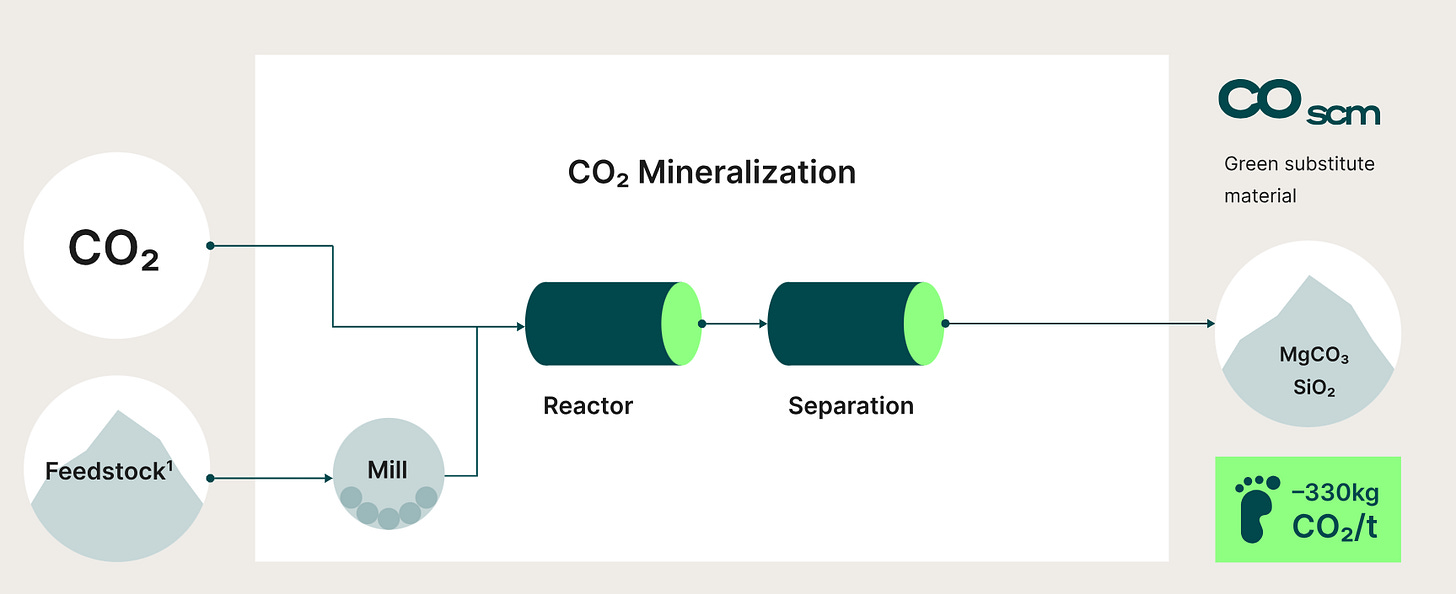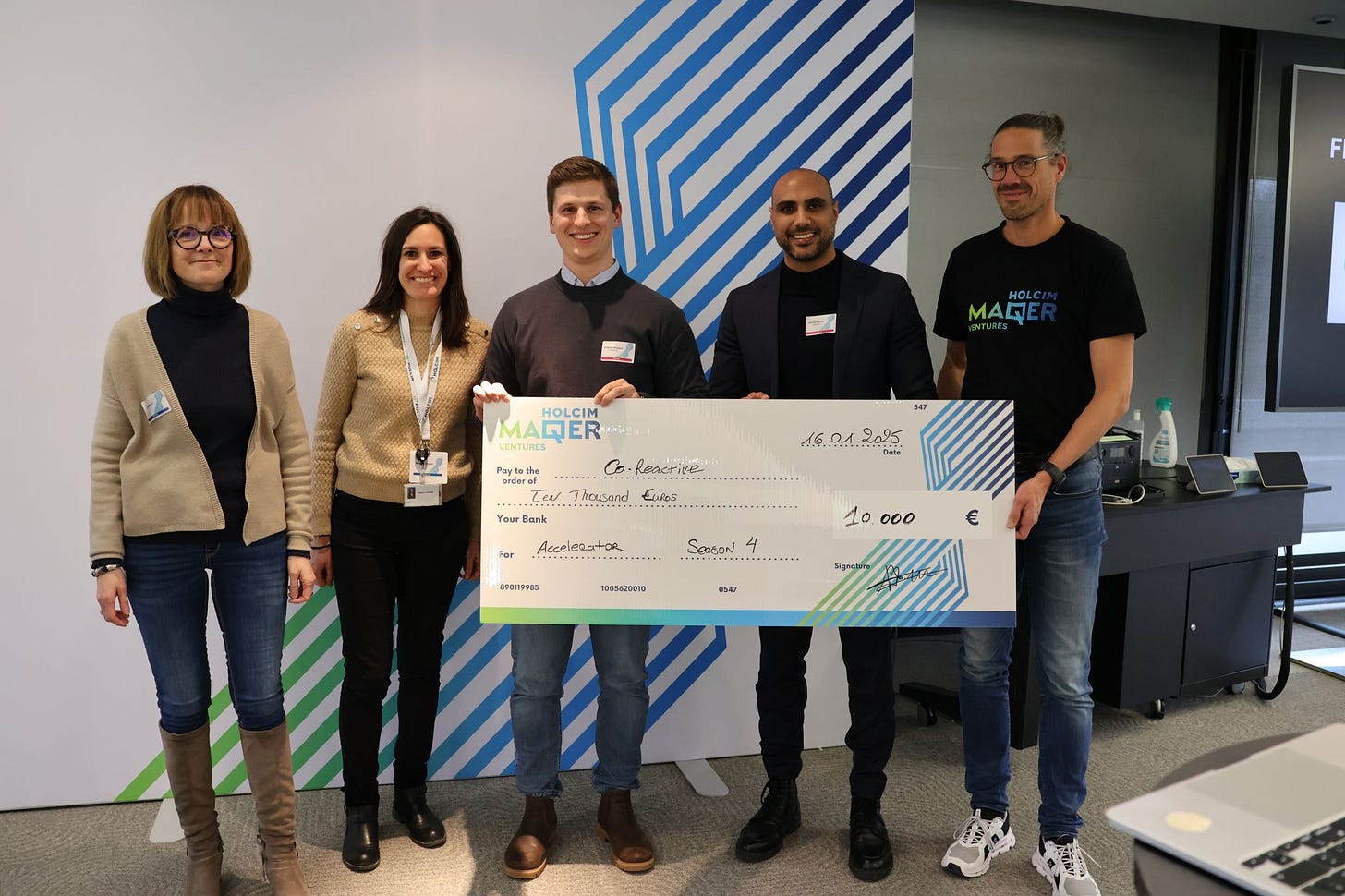Catch the latest VCo2 episode on YouTube, Spotify and Apple Podcast.
4-min read
👋 Hi, I’m Hugo - founder of VCo2.
Starting today, I’m launching a new format. Each week, I’ll spotlight one promising pre-seed/seed climate tech startup you should keep on your radar.
Today we are talking about a startup that is transforming CO2 into value.
Startup snapshot (30 sec)
🧪 Co-reactive - Transforming CO2 into high-performance Supplementary Cementitious Materials (SCM)
📌 Germany
🌱 Seed
⚙️ Carbon Capture and Green Materials
Problem (30 sec)
Cement production is a massive climate challenge – if it were a country, it’d be the third-largest CO₂ emitter with about 8% of global emissions (Source: Research Gate).
Meanwhile, big construction and tech firms have set net-zero goals, creating urgent demand for cleaner concrete.
Solution and Technology (30 sec)
Capturing carbon dioxide and mineralizing it into cement ingredients, effectively storing CO₂ inside concrete instead of the atmosphere.
Co-reactive’s product can blend into existing cement and concrete mixes without process overhauls. It claims to reduce concrete cost by 10% while cutting the carbon footprint by 50% at 35% substitution.
Proof of Concept and Traction (30 sec)
In a prototype reactor, the team demonstrated that they can transform captured CO₂ into a fine powder that replaces Portland cement by up to 50%.
Each ton of this material permanently locks away ~330 kg of CO₂ by converting it into stable carbonate minerals, all while boosting strength and durability of cement products.
At 25% substitution it claims to achieve the same compressive strength vs. standard cement.
Co-reactive won RWTH Aachen University’s 2023 Innovation Award for its CO₂ mineralization breakthrough and it recently took first place in Holcim’s Circular Construction accelerator program.
Founders, Team and Story (30 sec)
Spin-off from RWTH Aachen University’s renowned engineering labs
CEO Dr. Andreas Bremen holds a PhD in CO2 mineralization
CTO Orlando Kleineberg is the plant engineering guru
They both developed the core CO₂-to-cement technology
CCO Willi Peter brings business expertise from his commercial experience at Microsoft and experience scaling tech ventures.
Market (30 sec)
The market for green cement and low-carbon construction materials is booming, with an estimated $38.5 billion in global demand in 2024, projected to reach ~$68.6 billion by 2030 (source: Green Cement Industry Overview)
Climate regulations are kicking in, for instance: Europe’s Carbon Border Adjustment Mechanism will penalize high-CO₂ cement, pressuring suppliers to clean up (source: Carbon Border Adjustment Mechanism - European Commission)
Developers and builders are seeking sustainable options to meet their own ESG and net-zero commitments, creating a demand for carbon-friendly concrete.
Why should you keep them in your radar? (30 sec)
Co-reactive has early traction (awards, accelerator wins, and a convertible round from climate-focused angels) and a path to monetization by selling a value-added material at price parity on top of the carbon credits.
Its carbon-mineralization reactor and proprietary process create a high barrier to entry, and if it succeeds, the impact (both climate and financial) could be substantial.
They will likely start raising a seed round soon.
Questions that remains:
Can they achieve the same carbon capture efficiency and cement performance at ton-per-hour volumes and at competitive cost?
Will they be able to sell to the construction industry and get to an adoption rate fast enough to keep up with the rhythm of VC-backed startups?
That’s it for today! I hope you enjoyed this post.
Cheers,
👋 Hugo.
Subscribe to VCo2:
🔴 YouTube | 🟢 Spotify | 🟣 Apple Podcast










Great one
great article!